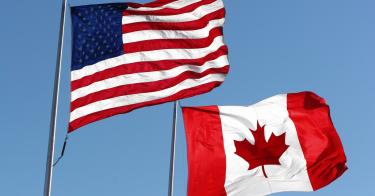It’s easy enough to get discouraged if you focus on this or that misstep by the U.S. or Canadian government, or on the occasionally strained relationship between the two neighbors.
But the truth of the matter is that our two countries remain very close trading partners—and both remain beacons of freedom and progress in a world that still cannot take those blessings for granted.
The latter point is illustrated by the just released 25th edition of The Heritage Foundation’s Index of Economic Freedom, a data-driven policy guide that measures degrees of entrepreneurial capacity and competitiveness in countries around the globe.
Canada’s economic freedom score is 77.7 out of 100, making it the eighth-freest economy in the world. The United States is close behind, in 12th place overall out of the 186 countries tracked.
Looking at the past 25 years, the overall picture for planet Earth is a positive one. The world as a whole has become freer, with the global average economic freedom score increasing by 3.2 points.
Quite a few countries have risen into the ranks of the “moderately free” or better. That is great news, since as economic freedom rises, prosperity tends to rise as well, and along with it, all of the good things that money can buy, including things like health and education.
As the 2019 index reports, America’s economic freedom has been clearly rebounding over the past two years, with strong signs of robust economic expansion triggered by the Trump administration’s major regulatory and tax reforms that have elevated business confidence and investment.
The U.S. economy is becoming more vibrant and the coming years present an opportunity to implement policies that advance economic freedom, despite some trade and spending worries.
Although Canada’s economic freedom score has not changed over the past year, its score has increased by about 8 points since 1995. As the index notes, Canada has moved its economy in the direction of lower deficits, lower taxes, and lower debt over the years.
The country’s relatively prudent federal budget management, coupled with sound fiscal reforms, has enabled the economy to sharpen its long-term competitiveness with a better fiscal position.
Increased deficit spending in the past few years, though, has eroded some of Canada’s gains.
Beyond short-term movements, however, Canada and the United States have both remained well above the global average for economic freedom the entire time.
In 25 years, Canada has always been at least 10 points above average, and now has an almost 17-point edge. The United States today has a similar, 16-point economic freedom advantage.
As for trade, the two longtime partners seem to have weathered last year’s storm with the successful renegotiation of the North American Free Trade Agreement (now called the U.S.-Mexico-Canada Agreement). Some irritants remain, and the new agreement still needs to be ratified, but things seem to have turned a corner.
The fact is that our two nations have a long history of cooperation, even when our leaders and governments have hailed from opposite sides of the political spectrum.
Though we don’t always see eye to eye about everything, that close relationship is not about to end anytime soon.
This piece originally appeared in The Daily Signal




